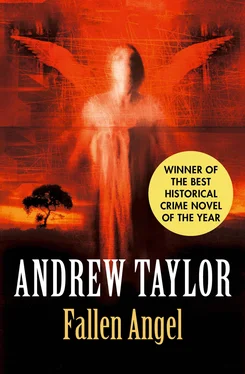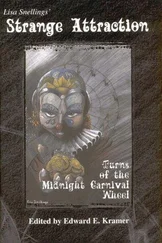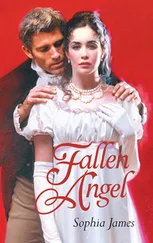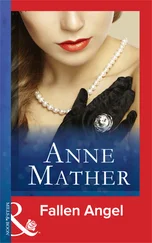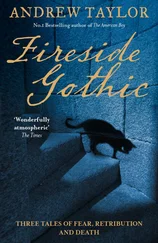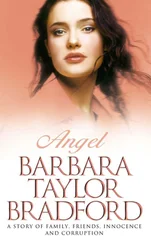Dear God, the pain. Had they had the decency to kill her first, and kill her swiftly?
Sally ran her fingertip delicately down the leg, following the curve of the knee, on down the shin to the top of the boot. She bowed her head.
‘Mrs Appleyard?’ Maxham sounded anxious, with just a hint of exasperation. ‘That’s all we need, thank you. You’ve been very helpful. Very brave.’
Sally slipped the thumb and forefinger of her hand right round the ankle and squeezed it, through the plastic bag and the leather. She felt the hardness of the bone underneath.
‘Mrs Appleyard,’ said Ferguson, ‘there’s a possibility of postmortem damage. That could give us problems at the autopsy.’
Yvonne put her hand on Sally’s arm. Sally shook her off. Someone snarled like a dog deprived of a bone. Me. Puzzled, she ran her hand round the bend of the L and on to the foot itself. Maxham grabbed her other arm. She felt the toes. It wasn’t possible. Yvonne and Maxham pulled her gently back.
‘I’m sorry, Mrs Appleyard.’ Maxham allowed his exasperation to show plainly. ‘Now we’ll get you home. Your husband will be back soon.’
I don’t want my husband: I want Lucy.
Then Sally saw how the impossible might have happened. Must have happened.
‘The legs are too long,’ she said slowly. ‘So they aren’t Lucy’s.’
Maxham allowed Sally to sit inside the church because he could not think of a valid reason to prevent her. Besides, she knew, he had assumed that she wanted to pray, a possibility which embarrassed him. His embarrassment was a weapon she could use against him.
It was very cold. The gratings set into the cheap red tiles suggested underfloor heating, but either the system didn’t work or the people using the church could not afford to run it. The silence pressed down on her. The air smelt faintly of incense. The brass of the lectern was smudged and dull. She glanced up at the roof, plain pitch pine, full of darkness, shadows and spiders’ webs.
Her eyes drifted along the line of the roof to the east wall. A large picture in a gilt frame hung above the altar. The light was poor and the paint was dingy. Maybe the Last Judgement, Sally thought, a cheap and nasty Victorian copy if the rest of the church was anything to go by. Christ in Glory in the centre of the picture, a river of fire spewing forth at his feet; flanked by angels and apostles; and below them the souls of the righteous queuing for admission to paradise; and the archangel with the scales – Michael or Gabriel? – weighing the souls of the risen dead. A picture story for children afraid of the dark.
And Lucy? Was she afraid? Or already dead?
Sally let out her breath in a long, ragged sigh. Don’t think about that. Think about the good news. The legs were not Lucy’s, any more than the hand had been. They were the wrong shape, wrong size, wrong everything. Lucy’s were thinner and less muscular, and her feet were much smaller than the feet which had been stuffed into Lucy’s red Italian cowboy boots.
At first Maxham had not believed Sally. Even Yvonne and Dr Ferguson had been sceptical. They had all been suspicious of her certainty, willing to attribute it to wishful thinking.
I’m her mother, damn you. Of course I know.
Sally bowed her head. Once again she tried to pray, to thank God that the legs were not Lucy’s, and that therefore Lucy might still be alive. But her mind swerved away from prayer like a horse refusing a jump. An invisible barrier hemmed her in, enclosing her in her private misery. It was as if the church itself had surrounded her with a wall of glass which cut off the lines of communication. For an instant she thought she glimpsed the building’s personality: sour, malevolent, unhappy – a bricks-and-mortar equivalent of Audrey Oliphant, the woman who had cursed her.
What’s happening to me? Churches don’t have personalities.
Gratitude was in any case misplaced. The legs had belonged to another child. Should she thank God for the other child’s death and mutilation? Beside that terrible fact, the goodness of God receded to invisibility.
Sally opened her eyes, desperate to find a distraction. On the wall nearest to her hung a board with the names of the incumbents inscribed in flaking gold letters, beginning with a Reverend Francis Youlgreave MA in 1891 and ending, seven names later, with the Reverend George Bagnall, who had left the parish in 1970. It was a big board and three-quarters of it was blank. No doubt Youlgreave and his immediate successors had imagined that the list of incumbents would stretch on and on, and that the building would always be a place of worship.
Things could never get better, she thought bitterly, only worse. How those long-gone priests would have hated the thought of her, a woman in orders. And what was the purpose of it anyway? It now seemed absurd that she had fought so hard to be ordained, and that she should devote her life to playing a minor part in the affairs of a dying cult. So far the effect had been wholly evil: she had ruined her own life, damaged Michael’s and abandoned Lucy. She was to blame. She was too angry with herself even to share the blame with God. Oh yes, he was still there. But he didn’t matter any more. If the truth were told, he never had. He didn’t care.
You mustn’t blame yourself. David Byfield’s words twisted in her memory and took on a bitter and no doubt intended irony. He blamed her. He always had blamed her, the woman who had committed the double sin of wanting to be a priest and taking away his Michael. She wondered yet again what bound the two men so tightly together. Whatever the reason, now she had her reward for breaking into their charmed relationship, and no doubt David was rejoicing.
Sally stared at the list of priests. The church’s dedication was written in gothic capitals at the head of the board: ST MICHAEL AND ALL ANGELS. Her mind filled with a thrumming sound, as though a thousand birds had risen into the air and were flying across the mud flats of an estuary. Her husband’s name was Michael, and the church was dedicated to Michael. Just a coincidence, surely. It was a common name. Only a paranoiac would think otherwise.
And yet –
This evil was beginning to take shape. It had been planned and executed over a long period. The brown-skinned hand in Kilburn Cemetery and the bleeding legs in the porch must be connected with each other because there were so many correspondences: both had been deep-frozen; both were parts of a child’s anatomy; both had been left in places which were sacred; and they had been found within twenty-four hours of each other. It was theoretically possible that the two were separate incidents – that the story of the severed hand had inspired a copycat crime – but this seemed less likely. The boots and the tights left no doubt at all that Lucy was at the mercy of the same person. Had there been a message there?
Lucy’s dismembered, too.
Whoever had taken her had not done so merely for sexual gratification or from emotional inadequacy; or if he had, that was only a part of it. What lay in the porch had been designed to shock. And the urge to shock had been so great that it had outweighed the risk of being seen.
The wings rustled and whirred. Not just to shock: also to tease.
Had Lucy been chosen not for herself but because she was a policeman’s child? Sally remembered Frank Howell’s feature on St George’s in the Evening Standard. Perhaps someone had read it who had a grudge against the police in general or Michael in particular.
Then why not leave the remains outside a police station? Why the church today and the cemetery yesterday? Perhaps the hatred was aimed at God rather than the police. A further possibility struck her: that this might be a more extreme form of the loathing which had gripped Audrey Oliphant; and in that case it followed that Sally herself, by wanting to become a priest, could have been directly responsible for bringing down on Lucy’s head the attention of whoever had taken her.
Читать дальше
